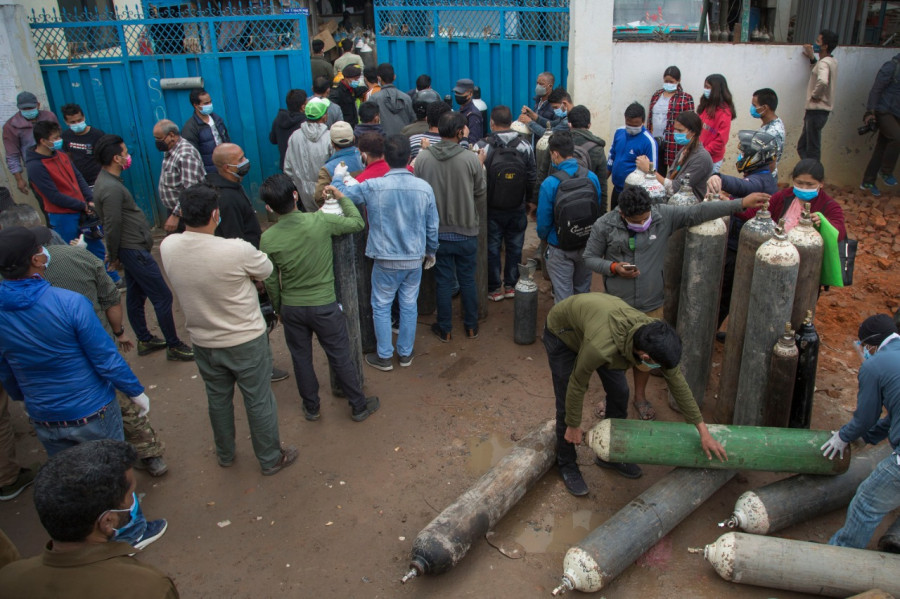Editorial
Help us, world
Nepal is counting on you for life-saving oxygen equipment and vaccines.
On May 12, Sara Beysolow Nyanti, the United Nations Resident Coordinator in Nepal, shared a BBC report about Nepal’s Covid-19 crisis and appealed to countries which can spare vaccines to send them to Nepal immediately. “Nepal has not been able to secure vaccines for even 20 percent of those who need to be vaccinated,” she wrote on Twitter. Two days later, she posted another tweet calling on the international community to see the vulnerability of Nepal differently from India. “We have a similar burden to India, but Nepal has less resources and capacity to cope... Nepal needs help urgently!” she wrote. On Saturday, Nyanti posted another appeal on Twitter: "Is the world listening? With the highest case positivity rate in the world, the data is also speaking. Send vaccines to Nepal now!"
The crisis that the country reels from is far from over. Biweekly changes in confirmed Covid-19 cases in the country indicate a decline in the positivity rate, but close to 45 percent of total tests still return positive results. Deaths continue to rise as the daily infection count hovers around the 7,300 mark. Hospitals have stopped admitting patients due to oxygen shortages. Over 110,000 people, as of Sunday, are either isolating at home or being treated in hospitals, and doctors fear more people will die without timely and sufficient care. In addition, the government continues to underreport hospital admissions across the country, and there is no basis for the recovery numbers that the Health Ministry releases every day.
The humanitarian crisis was not unforeseeable. Nepal’s Covid-19 situation only worsened last week, exposing the country’s broken health system and poor governance as record new infections and deaths were recorded; but two days before appealing to the world for help through an opinion piece in The Guardian, Prime Minister KP Sharma Oli told CNN on May 8 the “situation is under control” before going on to blame the people for the rapid surge in new infections. At a time when the world has shown concern about the dire developments as a more transmissible variant ravages Nepal, the prime minister’s damage control mode was unwarranted, and he missed the opportunity to appeal to the world for the kind of help Nepal needed as people started to die for lack of oxygen and hospital beds.
But for what the prime minister and his administration has lacked, members of the public, the Nepali diaspora, rights activists and high-level officials like Nyanti and various national and international non-governmental organisations have rallied support to attract international attention to a situation spiralling out of control. Last week, several United States senators also expressed alarm about Nepal’s situation. On the day The Guardian ran the prime minister’s opinion piece, Human Rights Watch issued a statement calling on the Oli administration to act urgently to avert a crisis. The rights body also urged donor countries like the United States, United Kingdom and European Union to make life-saving oxygen equipment and vaccines equitably available. On Friday, the World Health Organisation also acknowledged that Nepal has emergency needs as the country deals with spikes in cases and hospitalisations.
It’s not that the government hasn’t tried, but it hasn’t put its heart into the efforts to secure international assistance at a critical time when there is donor fatigue and a global shortage of resources. In its statement, the New York-based rights watchdog points out that in discussions among development agencies in the final week of April, international agencies spoke of a lack of clarity from the government regarding its priority needs and a lack of information about essential matters such as oxygen infrastructure.
Issuing circulars to Nepali missions abroad asking them to seek support and cooperation from the international community is not enough. Neither is it stately of Nepali diplomats to chase foreign dignitaries on social media. Both the prime minister and the foreign minister have big shoes to fill, given the unprecedented situation. They should use all resources at their disposal to capitalise on the opportunity to turn international concern into assistance, without which we cannot ensure lives or jabs. The Oli administration, which has committed to battle the pandemic in its fresh mandate, must ensure that we first have a plan to chart our way out of the pandemic.




 13.12°C Kathmandu
13.12°C Kathmandu














